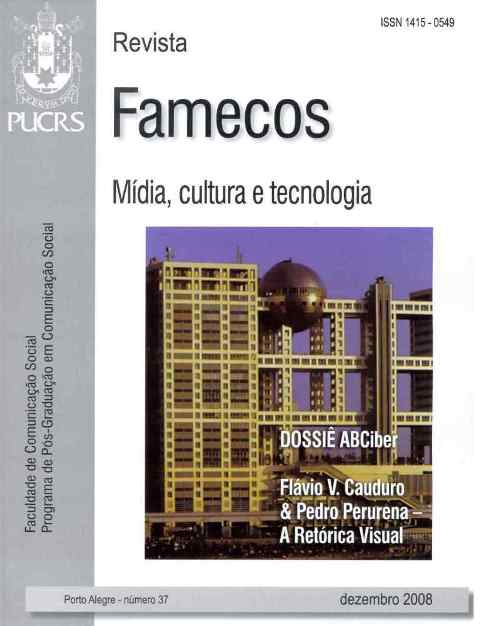"Think different": digital lifestyles and cyberculture as cultural expression
DOI:
https://doi.org/10.15448/1980-3729.2008.37.4794Keywords:
Cyberculture, cultural formation, iPhoneAbstract
The concept of cyberculture has conquered unquestionable legitimacy within the field of human sciences, where it comprises the backdrop for relevant issues regarding subjects as different as anthropology, philosophy or literary theory. However, its chronicle lack of definition and broadness sugest a likeness to media studies as a form of knowledge characterized by interdisciplinarity and an ongoing reevaluation of its frontiers. The goal of this work is to propose the definition of cyberculture as a discursive or cultural formation (Cf. Matrix, 2006; Foster, 2005), with coherent epistemological structures and approachable via a unifying perspective.Downloads
References
CAMPBELL, Heidi (2007). "iPhone= Jesus Phone?!?". Online. Disponível em: http://religionmeetsnewmedia.blogspot.com/2007/08/iphone-jesus-phone.html Acesso em: 15 nov. 2007.
COYNE, Richard. Technoromanticism: Digital Narrative, Holism, and the Romance of the Real. Cambridge: MIT Press, 2001.
DAVIS, Erik. Techgnosis: Myth, Magic + Mysticism in the Age of Information. New York: Three Rivers Press, 1998.
FOSTER, Thomas. The Souls of Cyberfolk. Minneapolis: University of Minnesota Press, 2005.
FOUCAULT, Michel. Les Mots et les Choses. Paris: Gallimard, 1996.
GITELMAN, Lisa. Always Already New: Media, History and the Data of Culture. Cambridge: The MIT Press, 2006.
IMPERIALE, Alicia. "Digital Skins: The Architecture of Surface", em Lupton, Ellen. Skin: Surface, Substance + Deisgn. New York: Princeton Architectural Press, 2002.
JENKINS, Henry. Convergence Culture: Where Old and New Media Collide. New York: New York university Press, 2006.
______. Fans, Bloggers, and Gamers: Exploring Participatory Culture. New York: New York University Press, 2006.
LANDOW, George. Hipertext: The Convergence of Contemporary Critical Theory and Technology. Baltimore: Johns Hopkins University Press, 1992.
LATOUR, Bruno. Jamais Fomos Modernos: Ensaio de Antropologia Simétrica. Rio de Janeiro: Editora 34, 2000.
Le BRETON, David. L'Adieu au corps. Paris: Métailé, 1999.
LEMOS, André. Cibercultura: Tecnologia e Vida Social na Cultura Contemporânea. Porto Alegre: Sulina, 2002.
MARVIN, Carolyn. When Old Technologies were New. Oxford: Oxford University Press, 1988.
MATRIX, Sidney Eve. Cyberpop: Digital Lifestyles and Commodity Culture. New York: Routledge, 2006.
NYE, David. American Technological Sublime. Cambridge: The MIT Press, 1996.
RÜDIGER, Francisco. Elementos para a Crítica da Cibercultura. São Paulo: Hacker, 2002.
RUTSKY, R.L. High Techné: Art and Technology from the Machine Aesthetic to the Posthuman. Minneapolis: University of Minnesota Press, 1999.
SHAVIRO, Steven. Connected, or What it Means to Live in the Network Society. Minneapolis: University of Minnesota Press, 2003.
TOFTS, Darren & JONSON, Annemarie & CAVALLARO, Alessio (orgs.). Prefiguring Cyberculture: an Intellectual History. Cambridge: MIT Press, 2002.
TRIVINHO, Eugênio. A Dromocracia Cibercultural: Lógica da Vida humana na Civilização Mediática Avançada. São Paulo: Paulus, 2007.
TURKLE, Sherry. Life on the Screen. New York: Touchstone, 1997.
Downloads
Published
How to Cite
Issue
Section
License
Copyright
The submission of originals to Revista Famecos implies the transfer by the authors of the right for publication. Authors retain copyright and grant the journal right of first publication. If the authors wish to include the same data into another publication, they must cite Revista Famecos as the site of original publication.
Creative Commons License
Except where otherwise specified, material published in this journal is licensed under a Creative Commons Attribution 4.0 International license, which allows unrestricted use, distribution and reproduction in any medium, provided the original publication is correctly cited.






